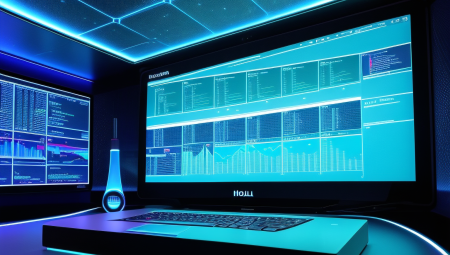In today’s rapidly evolving world, healthcare is undergoing a profound transformation thanks to a host of game-changing technologies. From artificial intelligence to virtual reality, these innovations are reshaping the way healthcare is delivered, experienced, and secured. In this blog post, we will explore the groundbreaking advancements that are propelling the healthcare industry into the future. We will delve into the ways in which artificial intelligence is revolutionizing healthcare delivery, the transformative impact of virtual reality on patient experiences, and the breakthrough potential of telemedicine in breaking barriers to quality healthcare. Additionally, we will discuss how blockchain is ensuring data security, how the Internet of Things is enhancing remote monitoring, and how precision medicine is tailoring treatments for individuals. Furthermore, we will explore the revolutionary impact of robotics on surgical procedures, the potential of genetic testing in uncovering personalized health insights, and the empowering nature of wearable health devices. Lastly, we will uncover the invaluable insights unlocked by big data analytics in healthcare. Join us as we embark on a journey into the future of healthcare, where these technologies are paving the way for a healthier and more connected world.
Table of Contents
Artificial Intelligence: Revolutionizing Healthcare Delivery
Artificial intelligence (AI) is transforming the way healthcare is delivered, revolutionizing the entire industry. AI has the potential to streamline processes, improve patient outcomes, and reduce costs. With the help of AI, healthcare providers can analyze large amounts of data to identify patterns and make more accurate diagnoses. This can lead to earlier detection and treatment of diseases, ultimately saving lives.
Another way AI is revolutionizing healthcare delivery is through personalized treatment plans. By analyzing a patient’s medical history, genetics, and lifestyle, AI can help providers develop customized treatment plans that are tailored to the individual. This has the potential to greatly improve patient outcomes and quality of life.
Additionally, AI has the ability to automate routine administrative tasks, allowing healthcare professionals to focus more of their time and energy on patient care. This can lead to more efficient workflows, shorter wait times, and ultimately, a better overall patient experience.
Overall, the integration of AI into healthcare delivery has the potential to revolutionize the industry, making it more efficient, cost-effective, and patient-centric. As technology continues to advance, the possibilities for AI in healthcare are endless.
Virtual Reality: Transforming Patient Experience
Virtual Reality (VR) is revolutionizing the way patients experience healthcare, offering immersive and interactive experiences that can alleviate pain, reduce anxiety, and enhance overall patient satisfaction.
By using VR technology, healthcare providers can transport patients to virtual environments that distract them from their medical treatments, making the experience more bearable. Whether it’s a calming beach scene for a patient undergoing a painful procedure or a virtual tour of famous landmarks for someone confined to a hospital bed, VR has the power to transform the patient experience.
Furthermore, VR can be utilized for therapeutic purposes, offering customized treatments for individuals suffering from chronic pain, PTSD, or other mental health conditions. By providing an escape from reality, VR has the potential to improve patient outcomes and overall well-being.
In addition to its therapeutic benefits, VR can also be used for patient education, allowing individuals to take virtual tours of their own anatomy, visualize complicated medical procedures, and gain a better understanding of their treatment plans. This immersive approach can empower patients to take control of their health and make informed decisions about their care.
Telemedicine: Breaking Barriers to Quality Healthcare
In recent years, telemedicine has emerged as a revolutionary solution to the barriers that many individuals face in accessing quality healthcare. The concept of telemedicine involves the use of telecommunications technology to provide clinical healthcare from a distance. This has significant implications for improving access to care for individuals who may not have easy access to traditional healthcare facilities, such as those living in rural or remote areas.
One of the key benefits of telemedicine is the ability to connect patients with healthcare professionals regardless of geographical boundaries. This means that individuals who reside in areas with limited medical facilities can still receive timely and quality care through virtual appointments and consultations.
Furthermore, telemedicine can also address the issue of long wait times for appointments, as patients can connect with healthcare providers remotely, reducing the need for in-person visits and streamlining the healthcare delivery process.
By leveraging telemedicine technologies, healthcare organizations can also enhance their capacity to provide specialty care, such as mental health services, to individuals who may not have local access to these types of services.
Blockchain in Healthcare: Ensuring Data Security
Blockchain technology is revolutionizing the healthcare industry by ensuring the security of sensitive patient data. Unlike traditional databases, blockchain uses secure cryptography to create a decentralized and immutable ledger of transactions. This means that once data is entered into the blockchain, it cannot be altered or deleted, providing a high level of data integrity.
With the increasing frequency of cyberattacks on healthcare organizations, the need for robust data security measures has never been more critical. Blockchain technology offers a solution to this challenge by providing a transparent and tamper-proof system for storing and sharing patient information.
Furthermore, blockchain technology enables secure and efficient data exchange between different healthcare providers, improving interoperability and streamlining processes. This not only enhances patient care and coordination but also reduces the risk of data breaches and unauthorized access.
By implementing blockchain in healthcare, organizations can gain the trust of patients and ensure the confidentiality and integrity of their sensitive health information. This technological innovation is paving the way for a more secure and transparent healthcare system, ultimately benefiting both patients and providers.
Internet of Things (IoT): Enhancing Remote Monitoring
The Internet of Things (IoT) is revolutionizing the way healthcare providers monitor and care for patients. Through the use of interconnected devices, IoT is allowing for the remote monitoring of patients, providing real-time data and insights that can improve both the quality and efficiency of care.
By utilizing IoT, healthcare professionals can track vital signs, medication adherence, and other important health metrics from a distance. This technology enables early detection of potential health issues, allowing for timely interventions and personalized treatment plans.
Furthermore, IoT has the potential to significantly reduce the burden on healthcare systems by minimizing the need for in-person appointments and hospital readmissions. As a result, patients can enjoy greater convenience and flexibility in their care while also experiencing improved health outcomes.
Overall, the integration of IoT in healthcare is enhancing remote monitoring capabilities, promoting proactive and personalized care, and empowering patients to take a more active role in managing their health.
Precision Medicine: Tailoring Treatments for Individuals
The field of precision medicine is revolutionizing the way healthcare treatments are designed and implemented. By taking into account an individual’s genetic makeup, lifestyle, and environment, precision medicine aims to tailor treatments to each patient’s unique needs, ultimately leading to more effective and personalized care.
One of the key benefits of precision medicine is its ability to target specific genetic mutations that may be driving a patient’s disease. This approach allows healthcare providers to develop treatment plans that are more likely to be successful, while minimizing potential side effects.
Furthermore, precision medicine is paving the way for the development of new, innovative therapies that are tailored to specific patient populations. This personalized approach to treatment is helping to improve patient outcomes and quality of life.
As precision medicine continues to advance, it has the potential to revolutionize the healthcare industry by shifting the focus from a one-size-fits-all approach to one that is tailored to each individual’s unique biology and health needs.
Robotics: Revolutionizing Surgical Procedures
Robotics is transforming the field of healthcare in a major way, particularly when it comes to surgical procedures. The use of robotic technology in the operating room has made significant strides in recent years, enhancing surgical precision, reducing recovery time, and ultimately improving patient outcomes.
One of the main advantages of robotic-assisted surgery is the capability to perform minimally invasive procedures with greater accuracy than traditional methods. Surgeons are able to control robotic arms with high precision, allowing for complex surgeries to be completed through smaller incisions. This minimizes trauma to the patient’s body, leading to faster recovery times and reduced scarring.
Additionally, the integration of robotics in surgery has led to advancements in remote surgery, where a surgeon can perform a procedure from a different location using a robotic system. This has the potential to improve access to specialized surgical care in remote or underserved areas, as well as provide opportunities for surgical training and collaboration among medical professionals.
As the capabilities of robotic technology continue to advance, we can expect to see further innovations in surgical procedures, ultimately leading to better outcomes and enhanced patient care across the healthcare industry.
Genetic Testing: Uncovering Personalized Health Insights
Genetic testing is a revolutionary tool that has the potential to uncover personalized health insights for individuals. By analyzing an individual’s genetic makeup, healthcare providers can gain valuable information about their risk for certain diseases, how they may respond to certain medications, and what lifestyle changes can benefit their overall health.
Through genetic testing, individuals can gain a greater understanding of their own health and make informed decisions about their well-being. This personalized approach to healthcare allows for targeted interventions and treatments, ultimately leading to better health outcomes and improved quality of life.
With advancements in technology, genetic testing has become more accessible and affordable, allowing individuals to take control of their health in a way that was previously unimaginable. The insights gained from genetic testing can empower individuals to make proactive choices and changes that can positively impact their health for years to come.
As the field of genetics continues to evolve, genetic testing will play an increasingly important role in personalized medicine, paving the way for a future where healthcare is truly tailored to each individual’s unique genetic makeup.
Wearable Health Devices: Empowering Individuals to Take Control
In today’s digital age, wearable health devices have emerged as game-changers in the healthcare industry, providing individuals with the power to take control of their own health and well-being. These innovative devices, such as fitness trackers, smartwatches, and health monitoring wearables, offer users the ability to track various aspects of their health, including physical activity, heart rate, sleep patterns, and more.
By leveraging advanced sensors and data analytics, wearable health devices enable individuals to gain valuable insights into their health status and make informed decisions about their lifestyle and healthcare choices. With real-time monitoring and personalized feedback, users can proactively manage their well-being and take preventive measures to improve their overall health.
Furthermore, wearable health devices empower individuals to actively participate in their healthcare journey, fostering a sense of ownership and responsibility for their well-being. By effortlessly collecting and sharing data with healthcare providers, users can collaborate with professionals to develop personalized treatment plans and monitor their progress more effectively.
Ultimately, wearable health devices not only provide individuals with a convenient means of monitoring their health, but they also promote a proactive approach to wellness and encourage greater engagement in managing one’s own health, ultimately leading to improved outcomes and a higher quality of life.
Big Data Analytics: Unlocking Invaluable Insights in Healthcare
Big Data Analytics is playing a crucial role in revolutionizing the healthcare industry, as it enables healthcare providers to unlock invaluable insights that can lead to improved patient care and outcomes.
By harnessing the power of big data analytics, healthcare organizations are able to analyze large volumes of data from various sources such as electronic health records, medical imaging, and wearable health devices to identify patterns, trends, and correlations that can help in making informed decisions.
Furthermore, big data analytics can also be used to predict disease outbreaks, optimize hospital operations, and personalize treatment plans for individuals based on their unique health profile.
As the volume and variety of healthcare data continues to grow, the role of big data analytics in unlocking invaluable insights in healthcare will only become more significant in the years to come.




